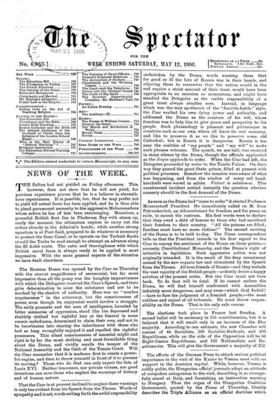That the Czar is at present inclined to neglect these
warnings is only too evident from his Speech from the Throne. Words of sympathy and trust, words setting forth the awful responsibility
undertaken by the Duma, words warning them that for good or ill the fate of Russia was in their hands, and adjuring them to remember that the nation would in the end require a strict account of their trust, would have been appropriate to an occasion so momentous, and might have steadied the Delegates as the visible responsibility of a great trust always steadies men. Instead, in language which was the very apotheosis of the " forcible-feeble " style, the Czar exalted his own dying power and authority, and addressed the Duma as the creature of his will, whose function was to help him to give peace and prosperity to hia people. Such phraseology is pleasant and picturesque in countries such as our own, where all know its real meaning, and like to preserve it as we like to preserve some old Cathedral ; but in Russia it is dangerous. Russia is too near the realities of "my people" and "my will" to make such phrases welcome. The speech, we are told, was received in stony silence by the Duma, though the officials applauded as the claque applauds to order. When the Czar had left, the Delegates proceeded by water to the Tauris Palace. On their way they passed the great State prison, filled at present with political prisoners. Somehow the inmates were aware of what was happening, and from the window of every cell hand- kerchiefs were waved in salute. Victuri te salutamus. This unrehearsed incident settled instantly the question whether amnesty should be the first demand of the Duma.










































